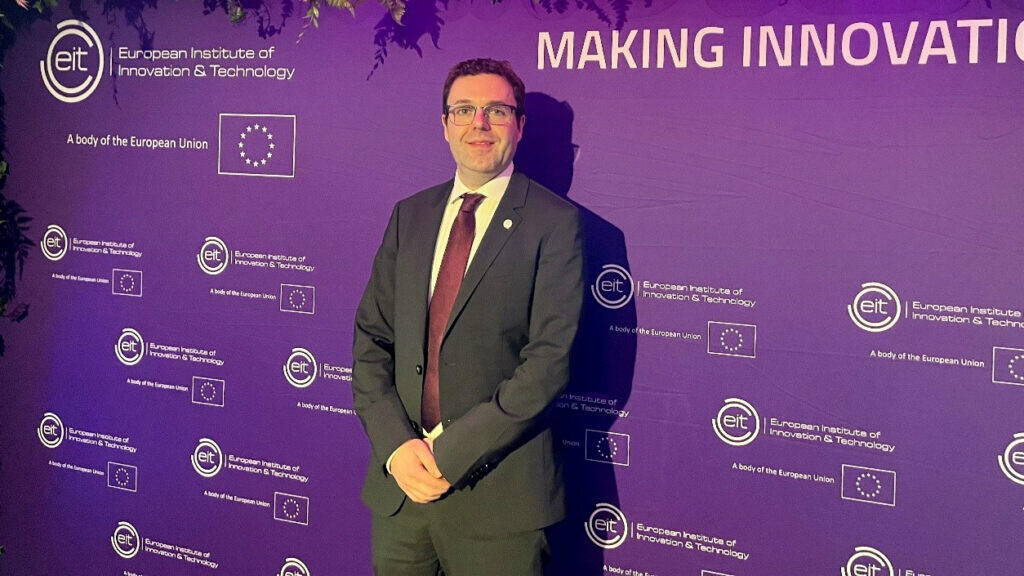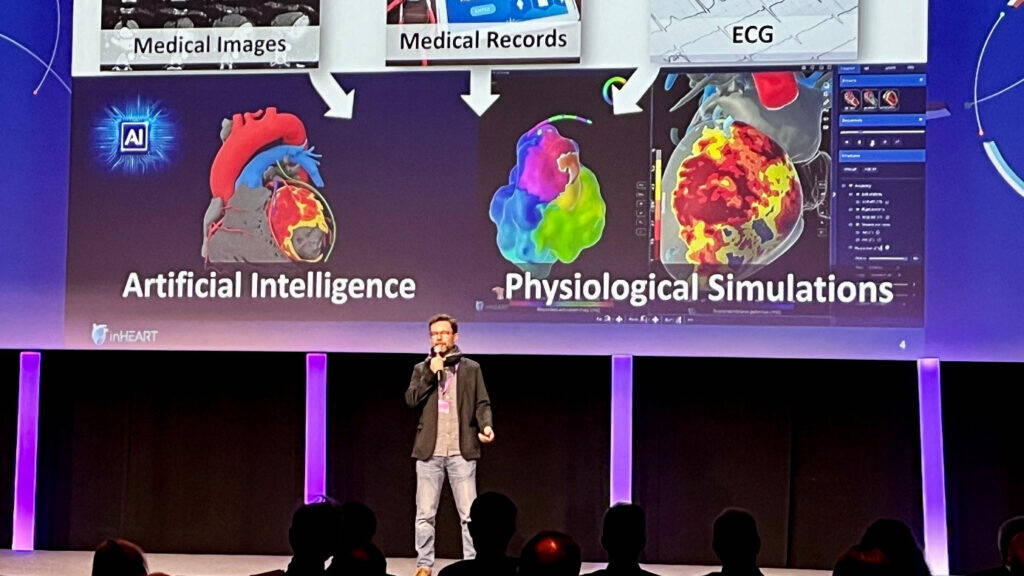Every year, the European Institute of Innovation and Technology (EIT) organizes a Summit to celebrate the best innovations made in Europe and to demonstrate that the Old Continent can be a hub for novel, breakthrough technologies. Named INNOVEIT, it's a showcase and a meeting point for the most promising startups and innovations.
It's both a conference where representatives from the European Commission, EIT, innovation community, and startups discuss how to make innovation happen and the EIT Awards Prize ceremony – a grand final of a flagship EIT competition aiming to recognize outstanding startups growing within the EIT, under its financial umbrella.
EIT has the capability to spark inventiveness: It is an independent body of the European Union established in 2008 to foster the development of entrepreneurial and innovation skills and bring new solutions to global societal challenges to the market, including supporting and financing European start-ups.
The Institute has a budget of EUR 3 billion and is integral to Horizon Europe, the EU's Framework Programme for Research and Innovation (budget: EUR 95.5 billion). EIT is the most extensive European innovation ecosystem with 2500 partners, 15 innovation hubs, and 8000 ventures that raised EUR 8 billion in investments.
However, EIT is not only about nurturing promising innovations with money – it's also about developing entrepreneurial skills among young citizens (EIT Campus) to equip students with know-how on how to change an idea into a solution and – most of all – build bridges between academia, business, and the innovation community (EIT Knowledge Triangle). For example, the Big Tech Talent Programme aims to develop a deep tech talent pool in Europe, while Knowledge Innovation Communities integrate private and public sector, education, and research to address critical societal challenges.
An explorer lesson on transformation: innovation brings benefits now, not tomorrow
"Without talents, no strategy of innovation will work," according to Margaritis Schinas, European Commission Vice-President who opened the Summit. "We don't have people we need in key areas. We need a new mindset of upskilling and reskilling."
The world is experiencing one of the most impactful transformations in decades: the AI revolution. According to the World Economic Forum, 83 million jobs globally will be lost over the next five years due to AI. Around 69 million jobs will be created. AI triggers shifts that pose both new opportunities for societies and threats. If not correctly orchestrated, transformation driven by AI can increase societal inequalities, leading to social polarization. "The cohesion of society is at stake," concluded Schinas.
Europe, with its academic centers and over 2700 higher-education institutions, has the capacity to innovate. But it often fails to do so. So, how do we make innovation grow and succeed? It requires not only good ideas and innovative minds but also a mind shift in society.
"Innovation is disruptive. We, as innovators, disrupt those who would like to maintain the status quo – the dangerous status quo. Some people hate innovation because it obliges them to change what they are doing in the way they used to," according to Bertrand Piccard, Swiss explorer and founder of the Solar Impulse Foundation.
The trick is in changing the narrative of transformations. "It's not decarbonization – but modernization. It's not about saving the planet – but about a better quality of life for everybody. It's not about the far future – but our life today, better workplaces, healthier environments we live in. It's not about restrictions – it's about progress and benefits," Piccard emphasized the importance of creating the proper storytelling around innovation, one that does not scare but inspires.
The discussion about transformation – whether AI, green energy or digital innovations in healthcare – should focus on benefits "here and now," not on the narrative packed with emotional "trigger points" that prompt negative attitudes toward change. These "trigger points" are usually arguments that portray transformation as a process leading to the loss of what people have and value. No one wants to give up something because someone is forcing them to.
"The most challenging part of every transformation is taking everyone on board and uniting them under a shared mission, no matter which side of the political scene they are on. Thus, we can't just tell people they have to change; we have to show them how and give them the confidence to change. For this to happen, we need political leaders who inspire, replacing details that may divide with benefits that unite."
In practice, transformation requires taking people out of their comfort zone and questioning why we are doing things we used to do and if we can do them better. Progress grows on the border of different disciplines and within diverse teams – according to a study by the World Economic Forum from 2020.
Staying competitive requires continuous upskilling
Almost every innovation is today a digital innovation. Thus, digital skills are becoming necessary for all to exist in a digital world.
"I think the most critical and urgent need is to ensure that everyone has some basic digital skills, to understand how technology affects their lives on a day-to-day basis and how they can work with it without being scared or making mistakes," according to Federico Menna, CEO of EIT Digital. "We also need to upgrade the university system – Europe has an opportunity with things like micro-credentials. There, we could offer small tokens of specific digital knowledge applied to what is really needed," he adds.
In an interview with ICT&Health, Menna emphasizes that Europe has a solid scientific background and the best universities, but if we don't modernize the economic sectors, progress won't happen. When comparing education systems between the US and Europe, American corporations play a more significant role in public and university education.
In fostering innovation, we have to establish regulatory sandboxes that provide a safe environment for testing and proving concepts without risking harm to society, combining safety with progress. Europe has it harder – ecosystem fragmentation hinders collective progress, so collaboration across regions is the only way to progress.
And there is one more essential element: corporates must feel the responsibility of being part of something bigger than their own business; they must contribute to upskilling, reskilling, and transformation.

An example is Bosch, an EIT partner with a strategic approach to fostering innovation by engaging with local universities, research centers, and SMEs. This decentralized approach enables them to tap into specialized talent and resources in rural areas, contributing to the regional ecosystem's growth and showcasing a model of collaborative engagement that benefits both the company and the broader community.
Many blame GDPR and Europe's "regulation instead of innovation" approach when discussing innovation-friendly strategies.
"Time showed that we were not that wrong in having the GDPR. Maybe it's a bit too complex, but other parts of the world followed us. As Europeans, we like to bring values in technologies," according to Menna.
"If we don't regulate, the big players will take most of the market because it's about data availability and computing power. A startup that cannot afford the same computing power as Microsoft or Google will inevitably fail. So I think it's good to have some regulation. The market is large. There's space for everyone, and maybe there's much to learn from others."
Digitalization is about upskilling and reskilling to keep citizens and the workforce aligned with the pace of transformation, as each new technology emergence raises concerns about job displacement, though ultimately, skilled individuals remain in demand. Rather than fearing technological advancements, it's crucial to invest in keeping skills updated to prevent individuals from falling behind.
EIT Awards. Who is the winner?
To promote the best European startups, EIT organizes the EIT Awards, nominating the most promising solutions addressing pressing global challenges across four categories. Beyond recognition, the winning teams receive EUR 50,000 for first place, EUR 20,000 for second place, and EUR 10,000 for third place.
During the EIT Awards Semi-Finals, nine finalists have been chosen within three categories:
EIT Changemaker
- Alba Forns (Spain): an impact investing platform bridging the climate finance gap.
- Axel Rimbaud (France): reducing the number of people killed or seriously injured in road crashes to zero.
- Mohamed Elamir (Egypt/Finland): cellulose-based biofoams that serve as a sustainable alternative to plastic foams.
EIT Venture
- Enline (Portugal): AI-driven sensorless Digital Twin technology to optimize power transmission asset monitoring.
- inHeart (France): AI-driven digital twin of the patient's heart, created from pre-operative CT and MRI scans to enhance precision medicine.
- ReCatalyst (Slovenia): Hydrogen technology focused on Proton Exchange Membrane Fuel Cells (PEMFCs) to overcome scalability and cost challenges tied to precious metals like platinum.
EIT Innovation Team
- Altris (Sweden): Revolutionizing sustainable battery technology through next-gen sodium-ion batteries.
- Biosimulytics (Ireland): quantum physics-based, AI/ML-powered pharmatech platform to improve the speed, scale, novelty, and success rate of drug development.
- HIQ-CARB (Germany): sustainable and resource-efficient nanomaterials for high-performance batteries.
Our heart was with inHealth – a finalist creating a digital twin of a heart for image-guided ablations. Click here to read an interview with inHealth and IDOVEN – another medtech startup nominated in the 10th edition of the EIT Awards.

The second medtech startup that made it to the EIT Award finals was Biosimulytics – technology integrating quantum physics, computational chemistry, machine learning, and high-performance computing to accurately and rapidly predict the most desirable force field energy configuration and crystal structure packing of new drug compounds. The innovation aims to support the pharma industry in addressing problems with polymorphism and getting from molecules to medicine (M2M) faster and with a much greater probability of success.
The winners of the EIT Awards 2024 are:
- EIT Changemaker: Mohamed Elamir
- EIT Venture: Altris
- EIT Innovation Team: Enline
- EIT Public Award: HIQ-CARB
Click here to read an interview with inHealth and IDOVEN







